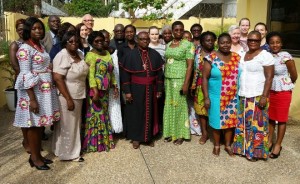Pharmacists Without Borders, two local bodies join to promote safe drugs
 The Scandinavia-based Pharmacists without Borders, and two bodies in Ghana, have signed a Memorandum of Understanding (MoU), to promote the safe use of medicines in local communities.
The Scandinavia-based Pharmacists without Borders, and two bodies in Ghana, have signed a Memorandum of Understanding (MoU), to promote the safe use of medicines in local communities.
The MoU was borne out of a four-day brainstorming workshop in Accra with the Pharmacists without Borders, Lady Pharmacists Association of Ghana (LAPAG) , and the Anglican Church Diocese of Accra.
Mr Sten Olsson, Chief World Health Organisation (WHO) Officer of the Pharmacists Without Borders, signed for the organisation; Right Reverend Dr Sylvanus Mensah Torto, Bishop of the Anglican Diocese of Accra, for the Church and Mrs Yvonne Yirenkyiwaa Esseku, signed for LAPAG as its National Chairperson.
The novelty long-term partnership being championed by Pharmacists without Borders aims at helping consumers in Ghana to protect themselves against the dangers of using sub-standard and falsified medicines and to strengthen the ability of consumers to make safer decisions.
There was consensus at the workshop that low quality medicines on the Ghanaian market pose serious risks to the health of consumers.
The three parties have therefore agreed to engage to increase consumer awareness on unsafe medicinal products and their rights regarding their health and strengthen their knowledge on the rational use of medicines.
A plan of action has been developed by the collaborating partners, including various strategies for interventions that aim to inform consumers on the safe use of safer drugs, primarily through the church parishes and the women groups.
A curriculum would be developed to support the training of trainers. The main part of the activities would be agreed upon through a series of meetings between representatives of the Anglican Diocese and LAPAG.
The MoU agreed to undertake baseline studies of consumer attitudes and knowledge regarding medicines and their use in order to measure effects of the planned interventions.
Mr Olsson who led the six-member delegation from Norway, Sweden and Denmark said he was incredibly happy and impressed about the goals of the workshop in providing consumers the tools to protect themselves against unregistered peddlers of inferior drugs sold at low prices.
He said the churches could be mobilised to create awareness about the use of inferior drugs.
Bishop Torto said one of the five pillars of the Church is about making a social impact and acclaimed Professor Alex Dodoo, Director of the WHO Collaborating Centre in Ghana, and an Anglican for being instrumental in facilitating efforts to promote the safe use of drugs.
He narrated his personal encounter with a fake drug peddler in a public commuter bus and therefore asked that the awareness against counterfeit drugs should not be a nine-day wonder.
Mrs Sarah Middleton-Mends of the Anglican Health Professional Guild of the Diocese lauded the positive influence of the workshop, explaining that during the medical outreach programmes of the Guild, members without expertise in pharmacy always had challenges with the administration of drugs.
Source: GNA
